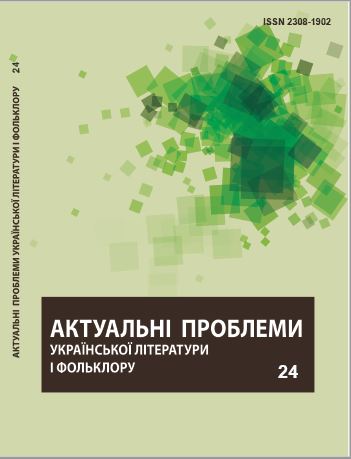The Lord's Prayer in art the reception of Ukrainian poets.
DOI:
https://doi.org/10.31558/2308-1902.2016.24.1Keywords:
Ukrainian poets, the Lord's Prayer («Our Father»), canonical prayer / poetic prayer, sacred original, poetic innovationAbstract
The article is devoted to analysis of the process of creative perception of the Ukrainian poets of the different periods of development of the national literature the text of the most authoritative of the Christian sacred text – the Lord's Prayer. Based on the conviction that prayer is a mirror of spiritual maturity of the person, the researcher explains the interaction of ethical dominants of Christian doctrine with the author's axiology, as well as with the leading ethical, philosophical and aesthetic trends of the era. Comparative analysis of Ukrainian innovation of Lord’s Prayer gives the suggests that old Ukrainian poets sought to recreate and aesthetize all moral and spiritual dominants of the Lord’s Prayer, obviously, with educational purposes. It was observed that remakes, imitations and stylizations of “paternoster” in newest time reflect the poets’ desire to understand their values, historical, social, political, ideological problems through deeply emotional rethinking of the basic concepts of Christian exemplarity and its reference to God. The most popular version of “paternoster” among Ukrainian poets of the nineteenth and twentieth centuries – a rethinking of the sacred text in a spirit of prayer for Ukraine, where cross-cutting becomes the motive of suffering Ukrainian people in need of God’s mercy and salvation, and where the kingdom of heaven is society of peace and harmony.References
Барабаш Ю. Тарас Шевченко: імператив України : Історіо- й націософська парадигма / Юрій Барабаш. – К., 2004. – 181 с.
Грушевський М. В тридцяті роковини Куліша : Соціяльно-традиційні підоснови Кулішевої творчості / Михайло Грушевський // Україна. – 1927. – Кн. 1–2. – С. 10–38.
Даниленко І.І. Модифікація жанрового канону молитви в поезії нового часу (на матеріалі «Псалмів Давидових» Т.Г. Шевченка) / І.І. Даниленко // Мова і культура : (наук. щоріч. журн.). – К., 2004. – Вип. 7. – С. 18–24.
Добротолюбие в русском переводе : в 5 т. / [пер. с греч. святителя Феофана, Затворника Вышенского]. 1883–1900. Т. 5. – Изд. 2-е, доп. – M., 1888. – (Репринт: СвятоТроицкая Сергиева Лавра, 1992). – 632 с.
Ильин И.А. Религиозный смысл философии / Иван Ильин. – М., 2003. – 694 с.
Иоанн Кассиан Римлянин. Писания / [Преподобный] Іоанн Кассиан Римлянин. − Мн., 2000. − 800с.
Иоанн Кронштадтский, св. прав. В мире молитвы / Святой праведный Иоанн Кронштадтский. – СПб., 1991. – 117 с.
Иоанн Лествичник, св. Слово о молитве с пояснениями ононого / Святой Иоанн Лествичний // Отцы церкви о молитве и трезвении. – М., 2001. – С. 119–155.
Криса Б. Пересотворення світу : Українська поезія XVII–XVIIІ століть / Богдана Криса. – Львів , 1997. – 219 с.
Лєпахін В. Ікона та іконічність / Валерій Лєпахін. – Львів, 2001. – 288 с.
Павличко Д. Твори : в 3 т. / Дмитро Павличко. – К., 1989. – Т.1 : Поезії. – 501 с.
Плужник Є. Поезії / Євген Плужник. – К., 1988. – 415 с.
Святі почуття, закладені в молитву : антологія української літературної молитви / [упоряд., автор вступ. ст. і приміток В.І. Антофійчук]. – Бухарест, 2004. – 399 с.
Тарановский К. Формы общеславянского и церковнославянского стиха в древнерусской литературе ХI–XIII вв. // О поэзии и поэтике / Кирилл Тарановский – М. , 2000.– С. 257–273.
Украïнська поезія : Кінець XVI — початок XVII ст. / упорядники В. П. Колосова, B.I. Крекотень. – К., 1978. – 430 с.
Хвильовий М. Твори : в 2 т. – К., 1990. – Т.1. Поезія. Оповідання. Новели. Повісті. – 650 с. 17. Хрестоматія української релігійної літератури: [у 2 т.]. Т. 2. Кн. 1. – Мюнхен ; Лондон, 1988. – 552 с.

